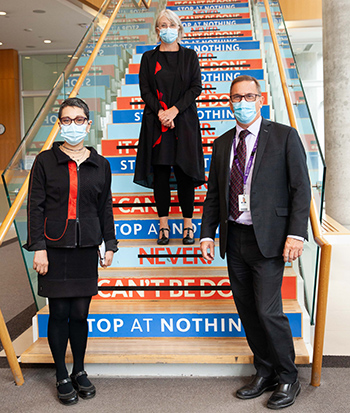Three St. Michael’s research teams awarded funding to study impact of COVID-19 on mental health and substance use services

By Ana Gajic

To celebrate our researchers’ work and learn more about it, Canada’s Health Minister Patty Hajdu (centre) visited the Li Ka Shing Knowledge Institute in early September.
How has the COVID-19 pandemic impacted people who were released from prisons and require mental health services? What about people who rely on in-person addiction treatment to wean off opioids? And how can we support those who are experiencing thoughts of suicide during this unprecedented time?
Three scientists and their teams at St. Michael’s Hospital hope to uncover the answers to these questions. They have been awarded funding through the Canada Institutes of Health Research (CIHR) Operating Grants: COVID-19 Mental Health & Substance Use Service Needs and Delivery to tackle their research questions.
The research and knowledge mobilization supported through these grants will help inform policy and practice in near real-time to respond to crisis-based needs. Since February 2020, CIHR has invested nearly $8.3 million in support of 13 COVID-19 research projects at Unity Health, in areas such as mental health, disease prevention, and therapeutics.
Congratulations to our researchers and their teams, whose projects are outlined below, for receiving this support.
Assessing mental health and substance use needs and service disruptions for people released from custody during the COVID-19 pandemic
In Canada, there are approximately 40,000 people in custody in correctional facilities on an average day and more than 250,000 people experience custody annually. A number of public health and correctional policy experts called for widespread release of people from custody during the pandemic to protect their health. In response, more than 2,300 people were released from jails in Ontario between March 16 and April 9, 2020.
Dr. Flora Matheson, a Scientist at MAP Centre for Urban Health Solutions, is interested in finding out how people released from correctional facilities during the pandemic have received mental health and substance use services, and whether they have experienced any disruptions or adaptations to the services they need. Dr. Matheson’s work will provide real-time, evidence-based agency and system-level recommendations to support the needs of this population as the pandemic continues.
Alterations in Prescribing of Opioid Agonist Therapy due to the Pandemic (ALT-POP) Study
A key treatment to help people who use illicit opioids is a medication that reduces cravings and prevents overdose. These medications, referred to as opioid agonist therapy, often require clients to frequently visit the pharmacy and their clinic. To ensure the safety of these clients during the pandemic, which has required physical distancing, several changes were made to how doctors and nurses provide these life-saving medications. These changes included less frequent visits to the pharmacy and reduced monitoring such as urine drug tests.
Dr. Ahmed Bayoumi, a Scientist at the MAP Centre for Urban Health Solutions, and Dr. Samantha Young, a PhD student in Dr. Bayoumi’s research group, will evaluate how the changes in prescribing of medications for opioid use disorder as a result of COVID-19 impacted the clients who take them. This study will help inform how to best provide these medications going forward in order to reduce overdose death and treat opioid use disorder during the pandemic and beyond.
Mitigating suicide risk during the COVID-19 pandemic via telehealth using an intensive single session of “Brief Skills for Safer Living”
Suicide risk factors have increased during the COVID-19 pandemic. To mitigate these risks, Dr. Sakina Rizvi, a Scientist at the Li Ka Shing Knowledge Institute, will study the effectiveness of a single-session psychotherapy intervention called Brief Skills for Safer Living (Brief-SfSL).
Dr. Rizvi’s study will be the first to test the effectiveness of Brief-SfSL on suicidal ideation at 3 months, which will be delivered by a certified psychotherapist through an online face-to-face meeting in 75 participants with suicide risk. At the Brief-SfSL session, and at virtual follow-up visits 1-week, 1-month and 3-months later, participants will complete questionnaires that measure suicidal ideation, depression, anxiety, social connectedness, life functioning and treatment utilization. This study will provide evidence for an effective and accessible suicide risk intervention that can be offered rapidly and widely to urban and rural communities during and post-COVID-19 physical distancing restrictions.
About St. Michael’s Hospital
St. Michael’s Hospital provides compassionate care to all who enter its doors. The hospital also provides outstanding medical education to future health care professionals in more than 27 academic disciplines. Critical care and trauma, heart disease, neurosurgery, diabetes, cancer care, care of the homeless and global health are among the Hospital’s recognized areas of expertise. Through the Keenan Research Centre and the Li Ka Shing International Healthcare Education Centre, which make up the Li Ka Shing Knowledge Institute, research and education at St. Michael’s Hospital are recognized and make an impact around the world. Founded in 1892, the hospital is fully affiliated with the University of Toronto.
About Unity Health Toronto
Unity Health Toronto, comprised of Providence Healthcare, St. Joseph’s Health Centre and St. Michael’s Hospital, works to advance the health of everyone in our urban communities and beyond. Our health network serves patients, residents and clients across the full spectrum of care, spanning primary care, secondary community care, tertiary and quaternary care services to post-acute through rehabilitation, palliative care and long-term care, while investing in world-class research and education. For more information, visit www.unityhealth.to.
